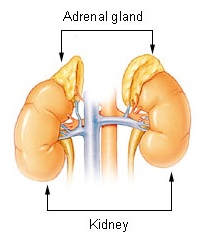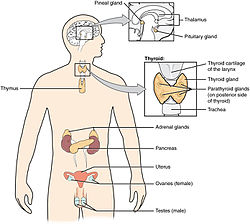Adrenomedullary
| Adrenal gland | |
|---|---|

The adrenal glands lie above the kidneys.
|
|

|
|
| Details | |
| Precursor | Mesoderm and neural crest |
| System | Endocrine system |
| Artery | Superior, middle and inferior suprarenal arteries |
| Vein | Suprarenal veins |
| Nerve | Celiac and renal plexus |
| Lymph | Lumbar lymph nodes |
| Identifiers | |
| Latin | Glandula suprarenalis |
| MeSH | A06.407.071 |
| Dorlands /Elsevier |
Adrenal gland |
| TA | A11.5.00.001 |
| FMA | 9604 |
|
Anatomical terminology
[]
|
|
The adrenal glands (also known as suprarenal glands) are endocrine glands that produce a variety of hormones including adrenaline and the steroids aldosterone and cortisol. They are found above the kidneys. Each gland has an outer cortex which produces steroid hormones and an inner medulla. The adrenal cortex itself is divided into three zones: zona glomerulosa, the zona fasciculata and the zona reticularis.
The adrenal cortex produces three main types of steroid hormones: mineralocorticoids, glucocorticoids, and androgens. Mineralocorticoids (such as aldosterone) produced in the zona glomerulosa help in the regulation of blood pressure and electrolyte balance. The glucocorticoids cortisol and corticosterone are synthesized in the zona fasciculata; their functions include the regulation of metabolism and immune system suppression. The innermost layer of the cortex, the zona reticularis, produces androgens that are converted to fully functional sex hormones in the gonads and other target organs. The production of steroid hormones is called steroidogenesis, and involves a number of reactions and processes that take place in cortical cells. The medulla produces the catecholamines adrenaline and noradrenaline, which function to produce a rapid response throughout the body in stress situations.
...
Wikipedia
